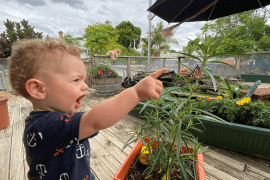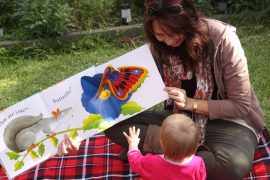The second problem is that it implicitly reinforces the notion that kids don’t know how to learn or what they need to learn. Our lack of trust in them leads to their own lack of trust in themselves and then we spend years trying to get them to become self-directed learners again by university. In a similar vein, we also take away the love of learning. When children direct their play and their learning, they gravitate towards things that interest them instead of being pulled back to something boring. Too many kids hate school and “learning” because they see it as a chore instead of what it is – a life-long process that benefits them.
A third problem is that we then miss the greater opportunity to shift our thinking on our own role as adults in the education of our children. I’m not saying there isn’t a place or time to introduce more didactic teaching (though some would argue there isn’t and this is definitely up for debate), but that our job as teachers (whether you’re a parent, an educator, or something else) is to provide the space for our kids to learn and to provide opportunities for them to become interested in topics that will speak to them. You can see this debate in the teaching of reading as phonics-based programs abound and though they work, most kids don’t develop the love of reading that comes when programs also focus on stories that are interesting to them.
A child that wants to learn to read will be able to sit for some of those didactic methods to help them achieve this goal, but if we start with the didactic methods, they may never reach the stage of loving to read.
There are likely many more problems that you can think of, but I want to give you one example from my own life that I hope illustrates what’s at risk here.
An example
My own son is 4. Starting around 3, he became very interested in playing store. He would have me set up the store and he’d bring random monopoly money to the store to buy various things. I would name a price and he would hand me any old bill. The question arose by others as to whether I was missing a valuable teaching opportunity to teach him about either counting or writing the names of the objects – basically one of the more “traditional” subjects of math or english.
I wasn’t doing any of that, but I was following his lead and just seeing where he was going with this.
Part of our exchange was all the pleasantries of asking what he wanted, offering change, and telling him to have a nice day, which he’d repeat back. This play went on for at least a month like this. He never seemed interested in getting the numbers right, didn’t care there were no signs, but he kept persisting and I’m sure many would think these were wasted opportunities.
Then we went out to a coffee shop and he wanted a muffin. He asked to be the one to order it and I watched as this little boy went through the whole process as we had done it.
The lady asked what he wanted, he told her, he gave money, and at the end he said, “Have a lovely day!” just as we do in our game.
These were no wasted opportunities. His goal in this game was to learn the social schema of buying things and being part of that transaction. Once he had that down, he was ready to try it out, and did so brilliantly. Had I imposed my own idea of what he needed to learn, I may have taught him some numbers, maybe letters, but I never would have thought about the social schema and he likely would have been too busy trying to take in what I wanted him to learn to actually learn what he felt was necessary.
Now he still plays store and we still have our interactions, but his interest is – surprise – in the numbers. He likes to read how much stuff costs in the store and this is all led by him. Seeing this, we also open up the opportunity to be interested by bringing in the weekly flyers from the stores for him to look at if he wants. And he does, over and over again.
I trust he will be interested enough to figure out adding and subtracting and all the rest of it and I hope you can develop that trust in your children as well.
Originally published here.
Tracy Cassels, PhD is the Director of Evolutionary Parenting, a science-based, attachment-oriented resource for families on a variety of parenting issues. In addition to her online resources, she offers one-on-one support to families around the world and is regularly asked to speak on a variety of issues from sleep to tantrums at conferences and in the media. She lives in Prince Edward County, Ontario, Canada with her husband and two children.










